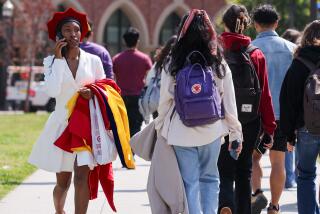Judging Plagiarism: Are We All on the Same Page?
- Share via
Why is it that society shrugs at adultery and goes nuts over plagiarism? One is cheating, and the other is . . .
Just asking.
I don’t endorse either activity, but only one of them would get me fired. President Clinton survived adultery, but U.S. Sen. Joe Biden once ended his presidential bid when it was revealed he’d lifted part of a speech.
If I had a solid moral core, I should be demanding the head of Trinity Law School dean Winston Frost.
Sorry, just can’t get there.
The dean of the Santa Ana school is accused of lifting some passages from the Encyclopaedia Britannica for a law review essay on human rights. I’ve read Frost’s article and the encyclopedia section on human rights, and let’s just say the dean has some explaining to do--and it had better be more persuasive than ‘the dog ate my homework.’
Frost is on leave while superiors review the disputed portions of his speech. Frost hasn’t commented publicly, but his lawyer says the article’s editor inadvertently omitted some footnotes.
Given the similarity in language, it’s hard to imagine what those footnotes could say, other than “lifted from the encyclopedia.” As any schoolkid past fifth grade knows, that’s generally considered a no-no.
Still, most of us probably don’t know what’s considered proper attribution when writing a professional paper.
Two UC Irvine professors tried to help me out. Both underscored what I already knew--that plagiarism is way, way up there on the list of academic sins. Both also said the issue can be complicated and that the specifics of a given case must be known in their entirety.
Virginia Mann, an associate dean and a professor of cognitive sciences, says, “If you know the content of what you’re writing about, it’s always easy to express it in your own words. The danger is when you’re writing about something you don’t know very much about.”
In those cases, she says, research is obviously necessary. In her field of psychology, a set of fairly concise guidelines dictates how to handle material gleaned from other sources.
Declarative statements that aren’t products of her own research, Mann says, are handled with footnotes--or, when appropriate, quotation marks with attribution to the original source.
However, she says, if any academic quoted verbatim from another source without attribution, it would be “very inappropriate.”
William Parker is a UCI vice chancellor and a physics professor. He says he flunks any student who blatantly plagiarizes. Offenders get reprieves only under the most extenuating circumstances.
Like Mann, he says there’s nothing inherently wrong with citing an encyclopedia, especially if the writer is trying to combine ideas from various sources. He also says any academic paper should be judged in its entirety, and that reviewers should “put any particular accusation [of plagiarism] in the context of that document.”
Frost perhaps will argue that very thing. If so, he’ll follow in the footsteps of many a junior-high student (“Hey, can I help it if Socrates and I think alike?”).
But let’s say he is found to have plagiarized. What to do with him?
In most academic circles, he’d be toast.
If I plagiarize a single column, I’m toast.
So I’m not here to defend the practice. I realize it’s the adult version of one of the first things schoolkids are taught: Don’t peek at your neighbor’s paper.
That’s a code worth living by.
To do otherwise reveals a weakness. But whether we’re talking about a fifth-grader or a law school dean, the question is whether it has to be a fatal one.
*
Dana Parsons’ column appears Wednesdays, Fridays and Sundays. Readers may reach Parsons by calling (714) 966-7821 or by writing to him at The Times’ Orange County edition, 1375 Sunflower Ave., Costa Mesa, CA 92626, or by e-mail to dana.parsons@latimes.com.
More to Read
Sign up for Essential California
The most important California stories and recommendations in your inbox every morning.
You may occasionally receive promotional content from the Los Angeles Times.













